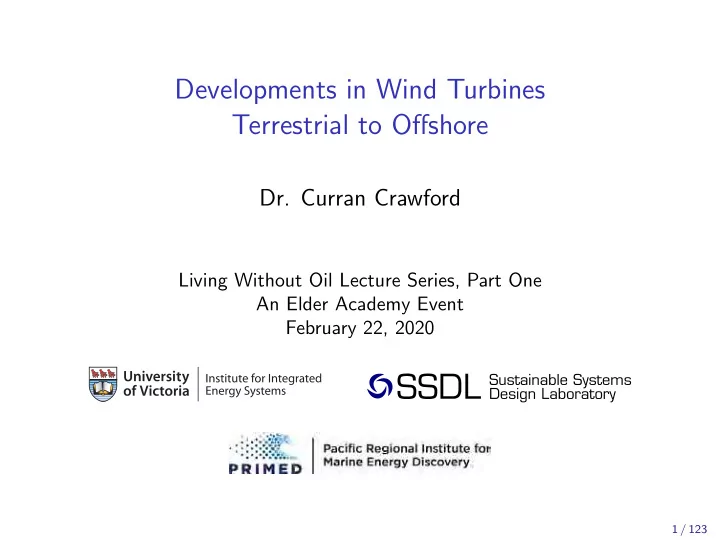

Wind turbine blades are massive composite structures ( https://www.themanufacturer.com/articles/fishing-fibreglass-hull-embraces-blade-production/ ) 57 / 123
Blades are made up of composite layups 0.1 0 -0.1 -1 -0.9 -0.8 -0.7 -0.6 -0.5 -0.4 -0.3 -0.2 -0.1 0 58 / 123
We can simulate composite wind turbine structures accounting for material variability ◮ Bayesian approach accounting for natural property variation and model deficiencies 59 / 123
The fundamental square-cube law continues to be ‘broken’ Capture area ∝ D 2 Mass ∝ D 3 ◮ LM 107.0 P blade (2019) - 220 m dia, 55 t mass 60 / 123
LM 107.0 P blade 61 / 123
Reducing blade weight as machines grow is a chief concern ◮ Reduce aerodynamic loads ◮ Reduce gravity bending moments ◮ Further reduce structural requirements GE fabric blade concept (canceled in 2014) 62 / 123
Transportation becomes a challenge! ◮ Localized manufacturing ◮ Offshore advantages 63 / 123
Deployment & Economics Wind Resource Installed Capacity Growth Decommissioning 64 / 123
Canadian distribution of wind resource at 50 m 65 / 123
Global average windspeeds at 50m height - Class IV 7m/s+ ( http://visibleearth.nasa.gov/view.php?id=56893 ) 66 / 123
The fact that the wind resource is globally distributed is a key attraction and motivator to harness it ◮ Very large potential resource ◮ Potential for GHG reductions in most economies ◮ Avoidance of conflict ◮ Fuel source not a geopolitical commodity ◮ Proliferation proof ◮ Relatively labour intensive ◮ Jobs sell energy ideas (look at marketing for oilsands, pipelines, etc) ◮ Wind prospecting & siting ◮ Localized manufacturing of large components ◮ Civil works 67 / 123
The fact that the wind resource is distributed is also a challenge ◮ Low energy (power) density compared to fossil & nuclear P density = 1 2 ρ V 3 ◮ Transmission to load centres ◮ Local impacts ◮ Nearby residents vs. landowners ◮ Visual (aesthetics & flicker) ◮ Acoustic ◮ Wildlife ◮ Variable ◮ Intermittent? ◮ Capacity factor impact on design & economics ◮ Implications for integration – a whole other talk! 68 / 123
Deployment & Economics Wind Resource Installed Capacity Growth Decommissioning 69 / 123
Global installed renewable generation continues to grow with wind making a large contribution after hydro Stack: Hydro, wind, solar, biomass Source: https://www.irena.org/Statistics/View-Data-by-Topic/Capacity-and-Generation/Statistics-Time-Series 70 / 123
Although still a relatively small contributor overall, wind is growing as a % of global electricity energy mix Source: https://www.nrel.gov/docs/fy18osti/70231.pdf 71 / 123
Electricity generation (capacity) type highly regional Source: https://www.cer-rec.gc.ca/nrg/ntgrtd/ftr/2019/index-eng.html 72 / 123
National Energy Board electricity generation (TWh) forecast 73 / 123 Source: https://www.cer-rec.gc.ca/nrg/ntgrtd/ftr/2019/index-eng.html
Installed wind capacity in Canada Source: https://canwea.ca/wind-energy/installed-capacity/ 74 / 123
Globally, wind power continues to expand through new build and re-powering Source: http://www.gwec.net 75 / 123
Future growth to continue Source: http://www.gwec.net ◮ Recent auction results, subsidy-free (2020-2022 delivery) ◮ e 0.025/kWh (Alberta) ◮ e 0.015/kWh (Mexico) ◮ Wholesale elec price for 700 MW Hollandse Kust (Netherlands) 76 / 123
China has like in many other areas dominated the picture Source: http://www.gwec.net 77 / 123
Deployment & Economics Wind Resource Installed Capacity Growth Decommissioning 78 / 123
Turbines typically have a 20 yr design life and machine size growth is rapid ( https://www.desertsun.com/story/tech/science/energy/2018/10/24/palm-springs-iconic-wind-farms-could-change-dramatically/1578515002/ ◮ Repowering with fewer, larger machines 79 / 123
Disposal/recycling is becoming an issue Wyoming landfill example (2019) 80 / 123
Playgrounds aren’t going to cut it... 81 / 123
Pyrolysis current option ( http://www.renewableenergyfocus.com/view/319/recycling-wind/ ) 82 / 123
Regardless, the GHG LCA of wind is very good (Moomaw et al. 2011) 83 / 123
(Hertwich et al. 2015) 84 / 123
Offshore Wind Energy EU Genesis Offshore Resource & Development Floating Offshore 85 / 123
Many projects have been developed over last 15 years 86 / 123
Some growing pains, but now mature ◮ London Array (2013): 630 MW, 175x Siemens 3.6-120 ◮ 370 MW Phase 2 abandoned in 2014 87 / 123
Optimal support structure is dictated by water depth and bottom geotechnics 88 / 123
Offshore transformer stations Nysted Lillgrund 89 / 123
Installation has lead to specialized equipment 90 / 123
Servicing has also spawned a specialized industry 91 / 123
Offshore Wind Energy EU Genesis Offshore Resource & Development Floating Offshore 92 / 123
Canada, and BC in particular, has a large offshore wind resource 93 / 123
BC’s coastal remoteness and bathymetry motives the investigation of floating offshore wind 94 / 123
Offshore turbines shift the proportion of costs to Balance of Station (BOS) and increases total costs Offshore reference turbine CAPEX breakdown ($5,600/kW) 1 ◮ 2018: e 2.45M/MW = $3,700/kW CND ◮ Site C: $10.7B/1100 MW = $9,727/kW *(55% capacity factor vs. wind rated power metric) 1 Tegen et al. 2012. 95 / 123
Continued drive towards larger machines Nov 2019 commissioning 96 / 123
Costs continue to fall over time with larger machines and more deployments ( http://euanmearns.com/a-review-of-recent-solar-wind-auction-prices/ ) 97 / 123
Recent data on offshore wind auctions ◮ Site C estimates: 0.02–0.07 USD/kWh ◮ 2018 German offshore wind auction average: 0.053 USD/kWh ◮ 2020 Shell/EDP Massachusetts Mayflower project: 0.058 USD/kWh 98 / 123
Offshore Wind Energy EU Genesis Offshore Resource & Development Floating Offshore 99 / 123
Floating offshore in first (array) project stages ◮ Tension-leg, spar buoy (ballast), and buoyancy stabilized platform concepts 100 / 123
Recommend
More recommend